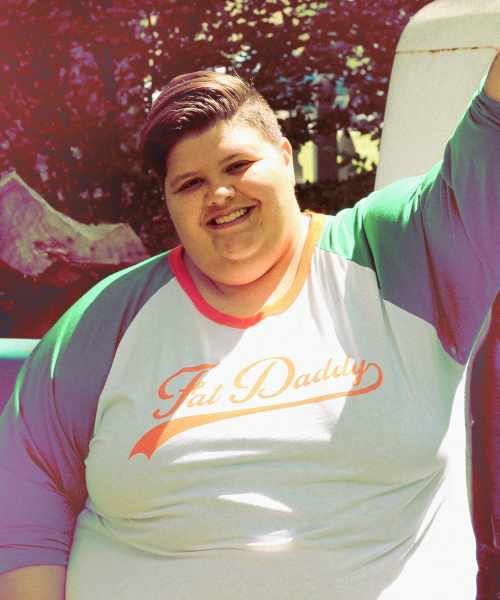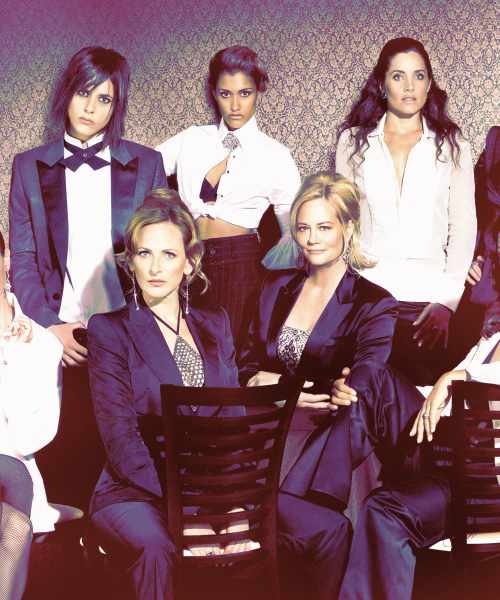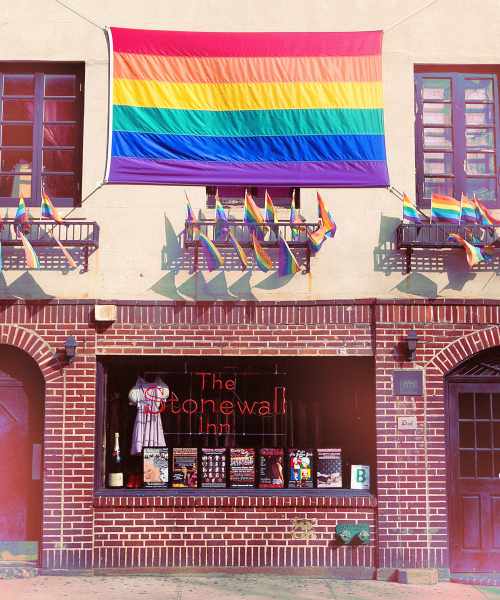
Katie Hill sinks into an armchair in her office in the Rayburn House Building in Washington, D.C., facing the massive wooden door. Always facing the door is a habit the 31-year-old freshman Democratic congresswoman picked up from her dad Mike, a Republican police lieutenant back home in the Santa Clarita Valley of California. For her, it’s a form of crisis management — you never know who’s on the other side. And according to Hill, who is one of only two openly bisexual members of Congress at a time when LGBTQ+ Americans face new threats to their rights every day, America is in the middle of multiple crises — a constitutional crisis, a healthcare crisis, a reproductive rights crisis. It’s why she ran in the first place.
“I feel like crisis brings out the best in me,” Hill tells Refinery29, while she scarfs down a microwaved noodle dish, careful not to get any on her pastel-pink suit and floral pumps. (She usually gets about five minutes for lunch. The day before, it was a Snickers, she says.) The daughter of a police officer and an ER nurse, Hill feels she was born to roll up her sleeves and help people when they need it. She recalls her family stopping on the freeway when she was younger and helping people who’d gotten into car accidents. “I can’t tell you how many times we stopped and my mom rendered care to people in an accident. And then, I started doing it.”
I come from a long line of nurses, including both of my grandmothers and my mom — in honor of #NationalNursesDay, I wanted to shout out all of the incredibly hardworking nurses in #CA25!
Thank you for being the heart of our healthcare! I am so grateful! ❤️? pic.twitter.com/CoLDWeqrc5
— Rep. Katie Hill (@RepKatieHill) May 7, 2019
As Vice Chair of the powerful Oversight Committee, and a member of the committees on Armed Services and Science, Space, and Technology, Hill is always hustling and putting out fires. This morning, she’s running from hearing to hearing — one about women in STEM, another on the opioid crisis — and then to a vote on preexisting conditions.
As co-chair of the Equality Caucus, Hill is on the front lines of fighting the aggressive rollback of LGBTQ+ rights since Trump took office. She says she wants to be a bridge between her progressive (and in some cases, more social media-ubiquitous) freshman colleagues and the more moderate Democrats. It’s evident in her interactions: She spends a few minutes catching up with fellow freshman Rep. Ayanna Pressley, but also laughs with Rep. Jim Jordan, a Republican, during a hearing. After the vote, House Leader Steny Hoyer gives her an encouraging pat on the shoulder in the hallway.
But on LGBTQ+ rights, she doesn’t budge — partially because it hits her personally. In the past two years, the Trump administration has appointed anti-LGBTQ+ judges, told the Education Department to lift protections for transgender students, signed off on rules that deny healthcare to and allow workplace discrimination against LGBTQ+ people, enacted a ban on transgender people serving in the U.S. military, and, most recently, moved to allow discrimination against transgender people at homeless shelters.
Asked whether she thinks the country will recover from the onslaught of discriminatory measures, Hill remains hopeful, although her tone often shifts to frustration. “It’s smaller and smaller pockets of people and communities that are still able to demonize and want to discriminate against LGBT people,” she says. “The times are changing, so we absolutely will be able to recover. The question is how much damage we can mitigate in the meantime. And, you know, it’s something that just makes me mad, right? Because it’s just stupid.”
Currently, there are fundamental barriers to getting laws passed that help LGBTQ+ people. Sexual orientation and gender identity aren’t included in the Census, something advocates are trying to change, which makes it hard to create any type of quantitative policy so people can get access to federal programs such as housing and Medicaid, and have their civil rights protected. Without numbers, it’s hard to study why, for example, bisexual women tend to experience disproportionately high rates of sexual assault — something Hill herself has said she has survived.
Another major challenge is that in over half of U.S. states, discrimination against LGBTQ+ people in employment and housing is legal, which means no protections if you’re fired or evicted. But with the new Democratic majority in the U.S. House, there has been more movement than ever on a federal anti-discrimination law — so there is some hope in sight. The House passed the Equality Act on May 17, an amendment to the Civil Rights Act of 1964 that would protect against discrimination on the basis of sexual orientation and gender identity in the workplace, housing, jury selection, and public accommodations.
When the Florida Republican Greg Steube called to ensure that under the bill, transgender women in sports wouldn’t be able to take opportunities from cisgender women, his motion was defeated in a 228-181 vote. Hill took to the podium in response, visibly angry.
Today, my colleagues on the other side of the aisle tried to kill the #EqualityAct because of their own prejudice.
They are on the wrong side of history. And we are waiting for them on the other side. ?️? pic.twitter.com/Aw0a7pYUQd
— Rep. Katie Hill (@RepKatieHill) May 17, 2019
“I can’t believe we’re standing here and having a man tell me what kind of protections I need in sports!” she raised her voice. “This is fear mongering about trans women playing in sports. Are you kidding me? … Through my work on the issue of homelessness, I saw trans women disproportionately affected by discrimination at every stage of their lives. They have higher rates of poverty, of sexual abuse, and homelessness. I can tell you that no trans person is trying to game the system to participate in sports. That does not happen. And that is a sad scare tactic that has no place on the floor of the People’s House. … You, my colleagues, are on the wrong side of history. And we will be waiting for you on the other side.”
Hill has the same attitude about LGBTQ+ rights as many other millennials, who rightly believed that same-sex marriage would be legalized in their lifetime. So when debates on people's basic humanity come up, when there are so many other pressing issues, she's often dumbfounded. The times are (however slowly) changing, though. The fact that the Equality Act was even passed is a huge deal: An early version of it appeared over 40 years ago in 1974, and the bill was previously introduced in 2015 and 2017, but was never able to leave committee. Hill sees that as a win.
Katherine Lauren Hill grew up “a little redneck,” as she has said, in California’s 25th District, which includes the sprawling suburbs and exurbs to the north and north-west of L.A., from wealthy Santa Clarita to the poorer blue-collar communities in the Mojave desert. As her parents both worked in public service, it was a natural calling for her. While she says she’s lucky to have grown up near L.A., which is more progressive on LGBTQ+ issues than most places, the area where she grew up wasn’t. She remembers hearing “the f-word” in school, and it wasn’t that long ago, she says, that people stopped using it.
“I think that we are a community that still has the vestiges of rampant discrimination,” she says, adding that some of her priorities in the district are battling housing and healthcare discrimination against LGBTQ+ people.
She says she became aware of her sexual identity around age 12 or 13, but wasn’t ready to acknowledge that it wasn’t a phase, which she says she was taught to believe, until after high school. In her large high school, she was one of four people in the gay-straight alliance, all of whom were her friends to begin with. She came out to her family when she was about 18, and says that although they were accepting, being bisexual brought particular challenges.
“I think neither my mom or my dad really understood that. I think it would have been easier for them if I were just to, like, ‘pick a side.’” she says. “Explaining it is not exactly a comfortable conversation for you to have with your parents. But I think they were about as great as they could be.”
Later, voting for Hill was the first time her dad said he voted for a Democrat: Grilling burgers as he watched the returns on Election Night, he told a local news outlet that she’s changed his views on healthcare and he’s influenced her views on fiscal responsibility.
Hill says when the Proposition 8 measure against same-sex marriage was passed in California, it had a profound effect on her. “When Prop 8 happened, it was right around the time that I had come out,” she says. “And it was just mind-blowing, knowing that my community voted for it en force.” She remembers her little brother Danny, around nine at the time, protesting with a “No on 8” sign — he’s usually not very political, but he wanted to stick up for her.
After graduating from public school and attending Cal State Northridge, where she majored in English and got her Master’s in public administration, Hill started as a policy advocate for PATH (People Assisting the Homeless), a nonprofit working to end homelessness in California. She quickly worked her way up to become the executive director, and raised the organization’s profile in California, helping pass a ballot initiative to provide $1.2 billion for homeless services in L.A. County.
She never had much interest in actually running for public office, however, but then Donald Trump happened. A “rainbow wave ” of over 400 LGBTQ+ candidates ran for office — and 57% won. It was Arizona Sen. Kyrsten Sinema, back when she was elected to the U.S. House in 2012, that let Hill imagine herself running for office as an open bisexual and winning. “I was like, ‘Oh my god, she’s from Arizona, she’s from this conservative area, and she’s open about it, and she won.’ So that definitely was a calculus for me in terms of being able to be open about it.” And when people pushed back, Hill just told them, “Well, she did it.”
It was on the campaign trail that Hill says she ran into some of the starkest biases. For starters, other politicians encouraged her not to be open about her sexuality since she could "pass" as straight. Hill has also been married to Kenny Heslep, an artist, for nine years, and they live on a small ranch in Agua Dulce, CA, with rescue animals, including a horse, goats, dogs, and cats — she goes back there as often as she can.
But she refused. “On the campaign trail, having to explain what bisexuality is to people was pretty unbelievable. People were like, ‘But you’re married to a man.’ … And so, a lot of people encouraged me to not be open about it. But I felt like it was important for me.”
Just as she did while campaigning, Hill hopes that by being in office, she can put a human face on LGBTQ+ rights for some of her colleagues and help them see how policy affects real people. She’s also been candid about her life in a way many of her older colleagues are not, because she believes it will eventually help others come forward about their own experiences. Case in point: recently admitting, amid the abortion bans in states like Alabama, that she once considered an abortion, and ended up having a miscarriage.
When it comes to the highest echelons of power, the politicians at the top still won’t move an inch on issues that are important to the LGBTQ+ community. Senate Majority Leader Mitch McConnell has called himself the “grim reaper” of legislation approved by the House, which means the Equality Act is extremely unlikely to clear the Senate. President Donald Trump has indicated that he won’t sign it into law because it’s full of “poison pills.” That’s why Hill says it’s important to “lay the groundwork” for a different Senate and White House.
“It’s very frustrating, because people ask, ‘What are you going to do about it?’” Hill says, when asked how she’s fighting against the various discriminatory measures put forth by the administration. “And what we need to do is vote. We need to change who’s in power, in a massive way. Because the reality is, there is just not going to be progress until that happens. No matter how hard we try.”
MORE REFINERY29 STORIES FROM PRIDE 2019
6 LGBTQ+ People On What They Wish Their Workplaces Looked Like
The Queer TV Renaissance Continues With The L Word Revival
From Midnight Raids To Same-Sex Marriage: What's Changed In The 50 Years Since Stonewall
Click HERE to read more.
You can publish this article on your website as long as you provide a link back to this page.





Be the first to comment